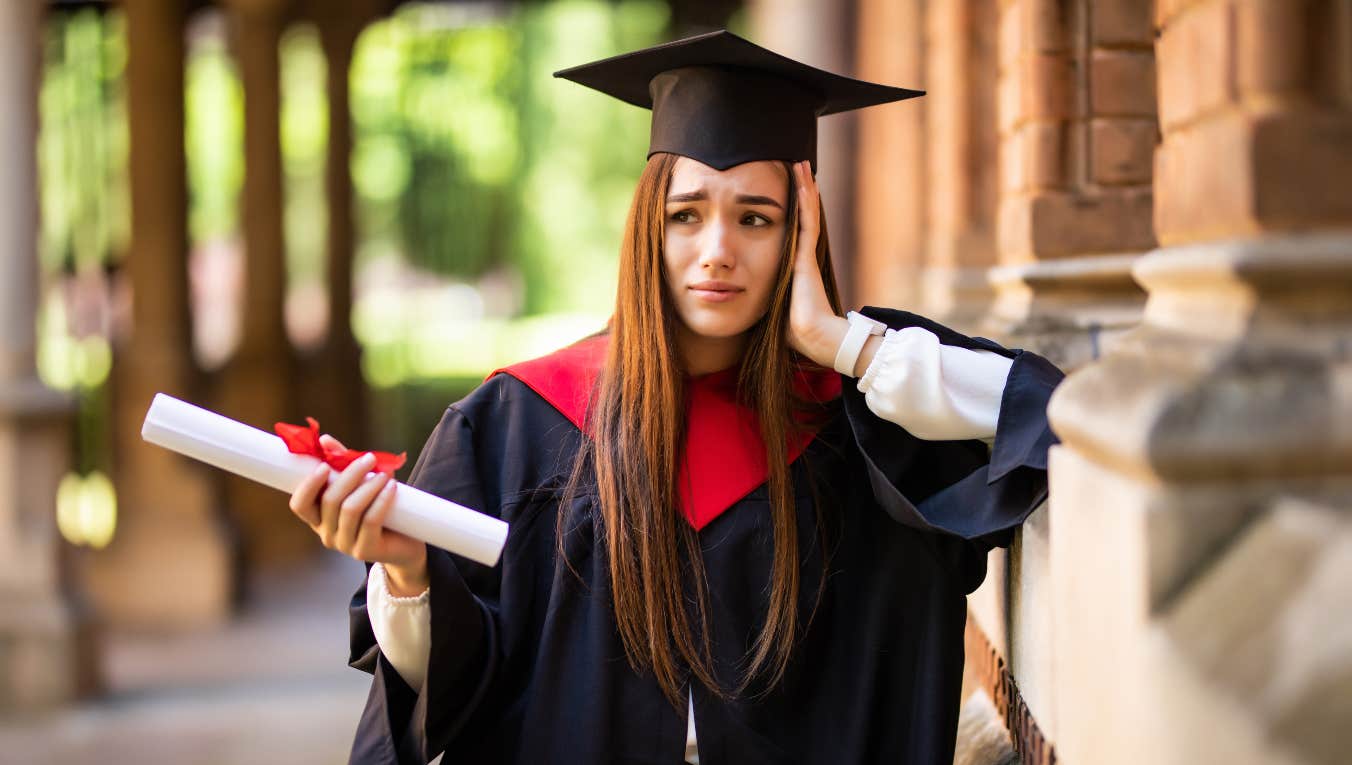Study Finds The More Educated You Are, The Less Likely You'll Experience This Life Milestone
The future might look a little different for college graduates.
 F8 Studio / Shutterstock
F8 Studio / Shutterstock Life is filled with milestones. From the minute we are welcomed into the world, our life seems to be measured by these big events: our first word, first steps, first love. The older you get, the bigger the milestones seem to get. You graduate from college, get your first real job, get married, and have kids. Each of these events is followed by a celebration because, well, these are the big things in life that we celebrate accomplishing.
Going to college is a big milestone in many people's lives. Its importance is pushed on us from a young age, and we're promised to get a good job if we just graduate with a degree. But what if achieving this milestone can affect the ones that come after?
A new study found that college graduates are now less likely to get married.
Research published in Education Economics uncovered the relationship between education and marriage, revealing a shocking finding. For each additional year of higher education that a person aged 25-34 achieves, their probability of getting married decreases by roughly 4%. However, for people with higher education aged 45-54, there was no significant impact found on whether they were married or not.
 Lacosteman | Shutterstock
Lacosteman | Shutterstock
The researchers also discovered that having a higher education increases the chances that someone will never get married, even later in life. The probability of remaining permanently single increases by about 2-3% for people of all ages.
On the other hand, the study found that education also reduces the odds of getting divorced or separating. This could be due to college graduates having more stable relationships or fear of the social stigmas surrounding divorce.
There are several factors that influence whether college grads choose to get married (or not).
Though the researchers had some interesting results, education levels aren't definitively linked to marriage rates. It's possible that people may have different personality traits or characteristics that affect their decisions to pursue higher education and to get married, which are harder to measure in data. These variables are why previous studies may not have shown the full picture.
The researchers theorized that educated individuals may have more selective marriage patterns. Actually, each additional year of education someone has increases their chances of having a college-educated spouse significantly. Depending on age and gender, the probability ranges from 13% to 24%.
College graduates also have more options than just marriage to consider. As study co-author John V. Winters said, "From expanding career opportunities to increasing independence, education reshapes what we look for in a partner, as well as when we’re ready to commit and whether we want to marry at all. Some people may feel they’ve gained the freedom to wait for the right match, while others may use that same sense of freedom to follow a path that doesn’t include marriage. And some people may find that education makes them more attractive to a prospective partner."
Higher education is reshaping life and relationship priorities.
As the number of college graduates increases across developed countries, marriage rates decline, suggesting some kind of correlation. However, this isn't necessarily a bad thing for educated individuals. It's simply a reflection of how times change as lifestyle preferences shift.
 Stock 4you | Shutterstock
Stock 4you | Shutterstock
Education levels are only one part of the decline of marriage rates, and other cultural, social, economic, and technological factors are likely also involved. Winters stated, "Many people value the institution of marriage for its sake, while others assign it importance based on religious, cultural, and social values. Economically, marriage has important consequences for children, including how many people have children and the resources that they can invest in those children."
He added that smartphones and social media should be examined for their role in declining marriage rates, saying, "We stay in more, go out less, and are increasingly divided — all of which could make people less likely to marry. The opportunities for future research related to marriage rates will continue to evolve with us."
While this study looked at marriage rates and education in a broad sense, it is interesting to see how education seems to open doors to other opportunities that don't necessarily include marriage as a required milestone to a happy life. In fact, perhaps the reason highly educated folks find themselves less likely to get divorced is that marriage isn't viewed as a necessity at all. It's an option that, should the right person come along, can make life better.
Kayla Asbach is a writer currently working on her bachelor's degree at the University of Central Florida. She covers relationships, psychology, self-help, pop culture, and human interest topics.

